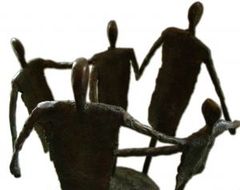What separates personalism from other philosophies and worldviews is its strong focus on the relationship between humans. Whereas individualism emphasizes individual freedom, and collectivism stresses the communal character of the collective, personalism emphasizes the interaction between the particular individuals in the community.

Only when we display our freedom with respect for and in relation to our fellow human beings, can we achieve real freedom for all people.
As human beings, we do not float freely in the air, independent of one another. We take part in numerous networks and relationships all the time, every single day. Our entire life is marked by relationships. It is quite telling how we designate each other using relational terms: mother, father, brother, sister, grandparents, colleague, neighbor, spouse, buddy, partner, enemy, friend.
It is through these relationships that our personality is formed, and it is within these relationships that we live our lives. In emphasizing relationships so strongly, personalism acknowledges that although we certainly are unique individuals, we are at the same time – in a positive sense – bound to each other.
We live in a society where relationships are placed under constant pressure. The close relations, which used to constitute a fixed point in one’s life, are no longer a matter of course. We have developed a society where human beings are often reduced to something less than persons. If our relationships become mere means to achieve our goals, then we adapt what the Jewish philosopher Martin Buber (1878-1965) calls an “I-It” relationship with other people instead of an “I-Thou” relationship. The negative consequences are obvious: When we conceive people as something else, something less than persons (e.g. clients, costumers, competitors), it becomes easier for us to make decisions and choices that have negative consequences in the lives of those concerned.
In personalist philosophy the human being unfolds its freedom, engagement and responsibility through relationships and community with its fellow human being. Humans are understood to be what the French philosopher Gabriel Marcel (1889- 1973) calls available (disponible) to one another. We are creatures that are disposed towards wanting, seeking, and forming relationships with others.
The Russian personalist Nikolaj Berdyaev (1874-1948) argues that personality, in its essence and nature, presupposes another human being. This understanding distances personalism from individualism, in which the fellow human being, at best, becomes something that we can keep or discard as we like.
According to personalism, individualism – and its political manifestation, liberalism – commits the error of conceiving the concept of freedom within a relational void. If we think of freedom as merely an individual privilege, we risk limiting the freedom of others through our personal choices. Only when acting out our freedom in a manner respectful of others and in relation to them can we achieve true freedom for all humans. Even though we do not stand in a direct relationship to the entire world population, we are still bound together by our common humanity. We are all persons, and thus our relationships cannot be reduced to race, ethnicity, religion, citizenship, or any of the labels by which we categorize humans. Personalism’s talk of humans as relational thus requires us to consider carefully the consequences of our local, national, and global politics for our fellow humans – these are consequences that impact human beings, people just like you and me.
The personalist anthropology, with its strong emphasis upon relationships, entails that should a human person loose his or her fellow humans – should others become alien or irrelevant – the human person will become alienated from him- or herself. Such alienation occurs because the person’s identity and possible ways of self-expression all exist in the relationship, engagement, and interaction with these fellow humans.
The personalist battle against alienation thus becomes a battle against the outdistancing, dissolution and perversion of relationships and communities. If the other human in relation to whom I developed my identity should disappear, a part of me will inevitably disappear as well. We are alienated from ourselves if our neighbor becomes alien to us (Latin: alienus), or if our fellow human has become an unwelcome threat, an alien. It is quite telling that the French word aliéné means insane; our mind is so closely connected to others that it becomes sick if the other becomes a stranger.
When relationships weaken or are perverted I loose myself in a profound sense, and I then become a stranger to myself, alienated. Bringing matters to a head one might say that humans only exist in as far as they exist for their fellow human being, or even: “Amo, ergo sum” (I love, therefore I am). We find this sentence in the work of personalists Emmanuel Mounier (1905-1950) and Karol Wojtyla (1920-2005).
